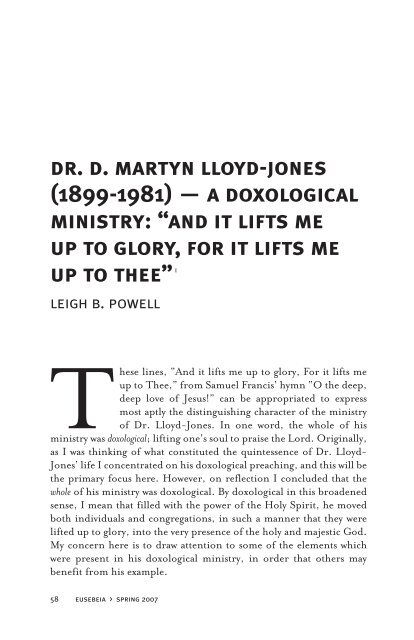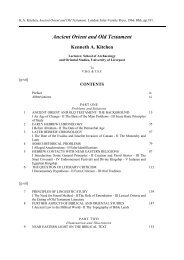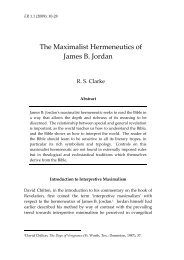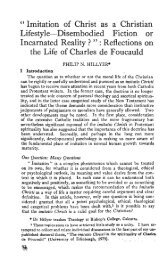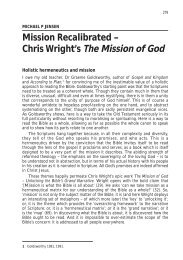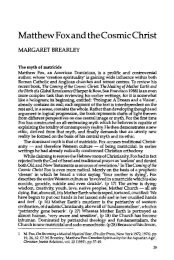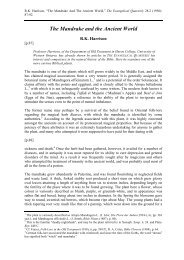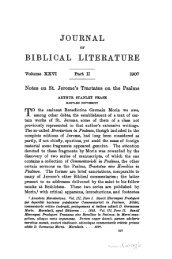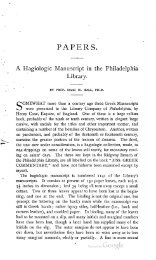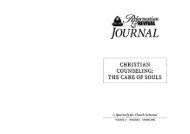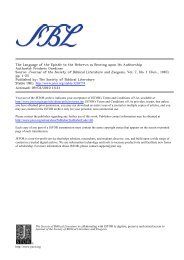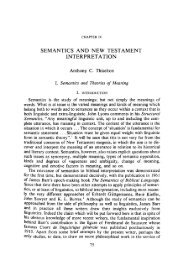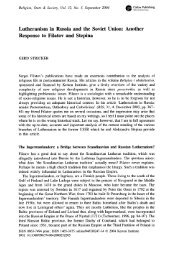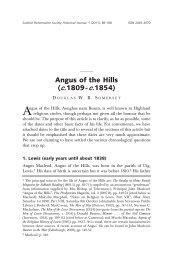dr. d. martyn lloyd-jones (1899-1981) — a doxological ministry: “and ...
dr. d. martyn lloyd-jones (1899-1981) — a doxological ministry: “and ...
dr. d. martyn lloyd-jones (1899-1981) — a doxological ministry: “and ...
Create successful ePaper yourself
Turn your PDF publications into a flip-book with our unique Google optimized e-Paper software.
<strong>dr</strong>. d. <strong>martyn</strong> <strong>lloyd</strong>-<strong>jones</strong><br />
(<strong>1899</strong>-<strong>1981</strong>) <strong>—</strong> a <strong>doxological</strong><br />
<strong>ministry</strong>: <strong>“and</strong> it lifts me<br />
up to glory, for it lifts me<br />
up to thee” 1<br />
leigh b. powell<br />
These lines, “And it lifts me up to glory, For it lifts me<br />
up to Thee,” from Samuel Francis’ hymn “O the deep,<br />
deep love of Jesus!” can be appropriated to express<br />
most aptly the distinguishing character of the <strong>ministry</strong><br />
of Dr. Lloyd-Jones. In one word, the whole of his<br />
<strong>ministry</strong> was <strong>doxological</strong>; lifting one’s soul to praise the Lord. Originally,<br />
as I was thinking of what constituted the quintessence of Dr. Lloyd-<br />
Jones’ life I concentrated on his <strong>doxological</strong> preaching, and this will be<br />
the primary focus here. However, on reflection I concluded that the<br />
whole of his <strong>ministry</strong> was <strong>doxological</strong>. By <strong>doxological</strong> in this broadened<br />
sense, I mean that filled with the power of the Holy Spirit, he moved<br />
both individuals and congregations, in such a manner that they were<br />
lifted up to glory, into the very presence of the holy and majestic God.<br />
My concern here is to <strong>dr</strong>aw attention to some of the elements which<br />
were present in his <strong>doxological</strong> <strong>ministry</strong>, in order that others may<br />
benefit from his example.<br />
58 eusebeia > spring 2007
<strong>dr</strong>. d. <strong>martyn</strong> <strong>lloyd</strong>-<strong>jones</strong> <strong>—</strong> a <strong>doxological</strong> <strong>ministry</strong><br />
the function of preaching<br />
The primary influence on Dr. Lloyd-Jones’ concept of preaching was<br />
Jonathan Edwards. Edwards believed that preaching should always be<br />
“warm and earnest.” 2 Lloyd-Jones cites Edwards’ view that “the main<br />
benefit obtained by preaching is by impression made upon the mind at<br />
the time, and not by an effect that arises afterwards by a remembrance<br />
of what was delivered.” 3 Lloyd-Jones, like Jonathan Edwards, was deeply<br />
concerned that his preaching produce an immediate impact upon the<br />
listener that would transfer him from darkness into His glorious light.<br />
The Doctor rejected anything artificial, anything that would allow the<br />
listener to detach himself from the preached Word and thereby evade<br />
God’s required response of faith. In his 1976 paper on Jonathan<br />
Edwards, commenting on Thomas Cartwright the Puritan Presbyterian,<br />
Lloyd-Jones said:<br />
The real function of preaching is not to give information, it<br />
is to do what Cartwright says; it is to give it more heat, to give<br />
life to it, to give power to it, to bring it home to the hearers.<br />
The preacher is not in the pulpit merely to give knowledge<br />
and information to people. He is to inspire them, he is to<br />
enthuse them, he is to enliven them, and send them out<br />
glorying in the Spirit. 4<br />
immediate genre identification and its implications<br />
Recent biblical studies have undergone quite a profitable transformation.<br />
Now the focus is on discovering the genre to which texts belong.<br />
Sidney Greidanus cites as genres: narrative, wisdom, gospel, apocalypse,<br />
prophecy, psalm and epistle. These types of literature all exhibit repeated<br />
elements that result in distinctive structures. He refers to smaller genres<br />
or literary units as “forms” or “subtypes” such as laws, <strong>dr</strong>eams, laments,<br />
parables, etc. 5 What is remarkable about Dr. Lloyd-Jones’ preaching is<br />
that it reveals that he had an instinctive grasp of the genres or forms in<br />
passages that he was preaching. He displays great skill in using their<br />
distinctives to convey the rich variety of the biblical genres. He thereby<br />
avoids distilling all this variety into a uniform series of abstract<br />
propositions. My wife and I shall never forget his brilliant recognition<br />
of genre in the sermon he preached at Knox Presbyterian Church in<br />
Toronto on September 8, 1963, the day after he assisted Dr. William<br />
Fitch in our marriage service. Let me attempt to convey something of<br />
eusebeia > spring 2007 59
<strong>dr</strong>. d. <strong>martyn</strong> <strong>lloyd</strong>-<strong>jones</strong> <strong>—</strong> a <strong>doxological</strong> <strong>ministry</strong><br />
the dynamic joy that was aroused by his preaching. This is how the<br />
Doctor began his sermon from Psalm 107:<br />
Now some of you may be surprised that I should propose to<br />
deal with 31 verses. Let me tell you why I am doing so. We must<br />
never forget that a psalm is after all a psalm. And it seems to<br />
me very often to be as pointless to deal with only one verse in<br />
a psalm as it would be to repeat but one note in a song. A song<br />
is a whole, and a psalm in the same way is a whole, and the<br />
psalmist in his psalm is anxious always to convey some one<br />
complete whole.… Though it is a long psalm, going on to 43<br />
verses there is a unity about it. There is one great message, and<br />
the man of course, announces it in these early verses. He starts<br />
by saying, “Oh give thanks unto the Lord, for he is good: for<br />
his mercy endureth forever. …Let the redeemed of the Lord<br />
say so, whom he hath redeemed from the hand of the enemy”<br />
(verses 1-2). That’s what he wants to do, to sing this great<br />
hymn of praise unto God. And the method he adopts is this.<br />
He seems to be gathering together a great choir to sing the<br />
praises of God. 6<br />
It is precisely at this point that his brilliant employment of the genre<br />
of psalms is displayed. Lloyd-Jones uses a series of questions to elicit<br />
an interested desire for answers, and he does so by inviting everyone to<br />
sing in a great choir:<br />
Do you belong to this Choir? Don’t you think that you had<br />
better come into training? Don’t you think that you had better<br />
join the Great Rehearsal on earth? … Are you offering your<br />
praise and your thanksgiving to Him? Are you studying the<br />
notes, are you perfect in your rendering, in your part? O my<br />
dear friends, give the whole of your time because that great day<br />
is coming and we shall be in that heavenly Choir and we shall<br />
sing forever and forever the praise of the Lamb that once was<br />
slain and has redeemed us. Make certain that you belong to the<br />
Choir. Amen. 7<br />
invitation<br />
Doxological preaching inevitably invites the listener to break out of<br />
60 eusebeia > spring 2007
<strong>dr</strong>. d. <strong>martyn</strong> <strong>lloyd</strong>-<strong>jones</strong> <strong>—</strong> a <strong>doxological</strong> <strong>ministry</strong><br />
individual isolation. Despite his presence in any gathering of people,<br />
an individual can still be very detached and coolly objective about what<br />
he is hearing. Lloyd-Jones in his preaching <strong>dr</strong>aws you into an immediate<br />
and active interplay with the scriptures. This message must be<br />
heard by everyone and so you are all encouraged to join a great choir<br />
to sing the praises of God. There can be no soloists or spectators for<br />
all are members of this choir. Throughout his sermon on Psalm 107<br />
he shows an acute awareness that this musical genre lends itself to invitations<br />
to everyone to sing in this great choir. Rhetorically, he swept his<br />
hand across the congregation like a conductor and pointed at one section<br />
of the congregation after another. “There are the sopranos!<br />
There are the altos! There are the tenors! There are the bass! … Are<br />
you all ready?” As he describes the conductor raising his hands he does<br />
so himself and quotes the conductor “You sopranos come along!” He<br />
describes their response: “And led them forth by the right way, that<br />
they might go to a city of habitation” (verse 7).<br />
exposition of the whole<br />
In 1969, I was a student at Westminster Theological Seminary,<br />
Philadelphia. Since I was a former member of Westminster Chapel<br />
London, I was asked to <strong>dr</strong>ive Dr. Lloyd-Jones to and from his lectures<br />
at Westminster Theological Seminary. 8 Sometimes I <strong>dr</strong>ove him to<br />
other churches. One Sunday I <strong>dr</strong>ove him to a well-known church in<br />
Philadelphia. Afterwards, when I asked him for his comment on the<br />
sermon the preacher gave, Lloyd-Jones replied that is was a “glorified<br />
word study!” He was not decrying the necessity for preachers to do<br />
the required word studies for a pericope, but he was criticizing the<br />
practice of deriving a sermon and basing it on one word while ignoring<br />
the total context of the passage. The glib saying that “one picture is<br />
worth a thousand words” has often been used to denigrate the value of<br />
preaching, and especially sermons of any length like those of Dr. Lloyd-<br />
Jones. However, words can do far more than pictures, for pictures<br />
cannot bring out the sheer complexity and depth of the meaning of<br />
life. Words can explain ambiguities; they can, as Dr. Lloyd-Jones<br />
frequently showed, conclusively connect Old Testament promises to<br />
New Testament fulfillment. Words are powerful tools, not merely<br />
because they convey information, but also because God by His Spirit<br />
uses words to move us to the joyful and obedient action that He<br />
desires (Romans 6:17).<br />
eusebeia > spring 2007 61
<strong>dr</strong>. d. <strong>martyn</strong> <strong>lloyd</strong>-<strong>jones</strong> <strong>—</strong> a <strong>doxological</strong> <strong>ministry</strong><br />
expectation<br />
This note of warm invitation noted above, contributed to the sense of<br />
great expectation that was apparent in both the preacher and the congregation.<br />
When we took friends to Westminster Chapel we expected<br />
things would happen, that souls would definitely be saved and believers<br />
would be thrilled, re-invigorated and restored to a joyful life of<br />
service and ceaseless praise of the Lord. When Lloyd-Jones stepped<br />
into his pulpit you were aware that he had come from the Throne-<br />
Room of the universe, and that there he had sought that God would fill<br />
him with his Holy Spirit. It was apparent that he had an urgent and<br />
important message to bring to us. In his final lecture on preaching at<br />
Westminster Theological Seminary he spoke pointedly to the widespread<br />
problem of too many ministers: a mechanical performance of<br />
duties including prayer and preaching:<br />
… What can we do without Him? Seek Him! Seek Him<br />
always. But go beyond seeking Him; expect Him. Do you<br />
expect anything to happen when you get up to preach in a<br />
pulpit? Or do you just say to yourself, “Well. I have prepared<br />
my ad<strong>dr</strong>ess, I am going to give them this ad<strong>dr</strong>ess; some of<br />
them will appreciate it and some of them will not?” Are you<br />
expecting it to be the turning point in someone’s life? Are you<br />
expecting anyone to have a climactic experience? That is what<br />
preaching is meant to do. That is what you find in the Bible<br />
and in the subsequent history of the Church. Seek this<br />
power, expect this power, yearn for this power; and when the<br />
power comes, yield to Him. Do not resist. Forget all about your<br />
sermon if necessary. Let Him loose you, let Him manifest<br />
His power to you and through you. I am certain, as I have<br />
said several times before, that nothing but a return of the<br />
Spirit on our preaching is going to avail us anything. This<br />
makes true preaching, and it is the greatest need of all today<br />
<strong>—</strong> never more so. Nothing can substitute for this. But, given<br />
this, you will have a people who will be anxious and ready to<br />
be taught and instructed, and led ever further and more<br />
deeply into the Truth as it is in Christ Jesus. This “unction,”<br />
this “anointing” is the supreme thing. Seek it until you have<br />
it; be content with nothing less. Go on until you can say,<br />
“And my speech and my preaching was not with enticing<br />
62 eusebeia > spring 2007
<strong>dr</strong>. d. <strong>martyn</strong> <strong>lloyd</strong>-<strong>jones</strong> <strong>—</strong> a <strong>doxological</strong> <strong>ministry</strong><br />
words of man’s wisdom, but in demonstration of the Spirit<br />
and of power.” He is still able to do “exceeding abundantly<br />
above all that we can ask or think.” 9<br />
<strong>doxological</strong> preaching and judgement<br />
Why is so much modern preaching powerless? Where today can one<br />
hear the <strong>dr</strong>iving urgency and awesome solemnity that characterized<br />
Lloyd-Jones’ preaching? Many preachers have a conversational style of<br />
preaching that suggests we can all relax, and “share” the kind of interesting<br />
thoughts one finds in Reader’s Digest. The preacher is often introduced<br />
as the “speaker” because he “speaks.” There is little recognition that in<br />
his office of preacher he does not merely “speak” but he “proclaims” or<br />
“heralds” the authoritative Word of God as the King’s appointed messenger. Every time<br />
he preaches, he conveys the Word of God that has eternal consequences<br />
for the destiny of each hearer (2 Corinthians 2:15-16). Lloyd-Jones<br />
himself said, “I felt that in preaching the first thing you had to do was<br />
to demonstrate to the people that what you were going to do was very<br />
relevant and urgently important…” 10 There was an earnest sobriety<br />
and evident concern that was instantly communicated to his listeners.<br />
I have never forgotten this. He would ask us to evaluate our hearing<br />
and reading in the light of this question: “What value will it be to you<br />
on your death-bed?” Everything in life had to be evaluated from the<br />
eternal perspective. Some contemporary Evangelical preachers have<br />
rejected the preaching of hell and they certainly see it as incongruous<br />
with any concept of <strong>doxological</strong> preaching. Undoubtedly, if there is no<br />
hell, the urgency and seriousness of preaching is greatly reduced. The<br />
listener will pay even less attention to the preached word when death is<br />
merely an extinguishing of the light and then <strong>—</strong> oblivion! However,<br />
Scripture, and Jesus in particular, do teach with absolute certainty and<br />
indisputable clarity, the reality of the eternal, conscious torment of the<br />
unrepentant sinner in hell. This fact often escapes a public’s attention<br />
that vehemently insists on rejecting any concept of final judgement.<br />
When a terrorist’s bomb destroys one’s own house and all one’s family<br />
members, there is often a quick switch. Now the sentimentalists<br />
demand instant judgement. When God does not immediately unleash<br />
a thunderbolt to destroy the terrorists, His very existence and Final<br />
Judgement are denied. As 2 Peter 3:3-10 demonstrates, the eternal<br />
God is not compelled to act according to man’s hasty, unfair judgement,<br />
but His “delay” in judgement mercifully and constantly answered<br />
eusebeia > spring 2007 63
<strong>dr</strong>. d. <strong>martyn</strong> <strong>lloyd</strong>-<strong>jones</strong> <strong>—</strong> a <strong>doxological</strong> <strong>ministry</strong><br />
the cries of those unbelievers who had experienced gross injustice.<br />
“For God so loved the world” (John 3:16). [What kind of world did He love? The<br />
important little adverb “so” emphasizes in the context that it was a world that “loved darkness<br />
rather than light, because their deeds were evil” (John 3:19)]. Such was God’s<br />
great concern that evil should be fully, even exhaustively punished, that<br />
He did this through the greatest sacrificial gift that He could possibly give<br />
mankind. Only the fully perfect and willing Son of God could propitiate<br />
the wrath of God against all evil. Since God’s universe is one of<br />
perfect justice (Romans 9:17,22-24) it calls for <strong>doxological</strong> glorying in<br />
His “true and righteous … judgements” (Revelation 19:2). In Revelation<br />
6:9-11 martyred saints seek a public display, not of vindictive or personal<br />
revenge, but of God’s holy justice, for these verses call for doxologies to<br />
the Judge who sets all things right forever.<br />
Clearly, one of Dr. Lloyd-Jones’ deepest disappointments was “a<br />
real change and a definite shift in the whole position of Anglican evangelicalism.”<br />
11 This change resulted in a practical denial of Sola Scriptura,<br />
the adoption of “higher critical methods in the study of the Scriptures,”<br />
and the changes respecting “the truth of salvation and the truth concerning<br />
the church.” 12 What made this theological shift so personally<br />
wounding to Dr. Lloyd-Jones was that some of those involved in it<br />
were long-time friends whom the Doctor had earlier influenced to<br />
adopt a full-orbed commitment to Reformed doctrine. In his 1977<br />
ad<strong>dr</strong>ess to the British Evangelical Council entitled The Sword and the Song,<br />
he focused on Psalm 149:5-6. He pointed out that if your doctrine of<br />
the Church was rooted in the concept of a national church which<br />
embraces liberals and Evangelicals [the Anglican via media = “middle way”],<br />
then compromise is inevitable. The motivation for this theological shift<br />
by some of the Evangelical Anglicans, the Doctor asserted, was that they<br />
“have been anxious to have an intellectual respectability and to be thought<br />
well of by the liberal scholars.” 13 Even many Reformed men can genuinely<br />
insist on their adherence to the doctrines of grace, while at the same time<br />
they are indifferent to liberalism. No positive action of separation was<br />
taken by these Reformed men against those who openly denied central<br />
Reformation doctrines such as Sola Scriptura and the forensic doctrine of<br />
justification by faith alone. To cap it all, Lloyd-Jones not only saw friends<br />
who co-operated with liberals, but observed others who increasingly made<br />
clear their belief in the enervating doctrine of annihilationism. 14<br />
In the light of our central proposition that the Doctor’s whole <strong>ministry</strong><br />
was <strong>doxological</strong>, how could we possibly assert that his “fight of faith”<br />
64 eusebeia > spring 2007
<strong>dr</strong>. d. <strong>martyn</strong> <strong>lloyd</strong>-<strong>jones</strong> <strong>—</strong> a <strong>doxological</strong> <strong>ministry</strong><br />
did raise doxologies in our hearts? We are still surrounded by scornful<br />
liberal critics. Men who claim to be Reformed and insist on their<br />
orthodoxy, still refuse to sacrifice their respectable reputations. They<br />
bow down and worship the god of Intellect. Let us listen to the<br />
Doctor’s response to our question:<br />
It is essential that we should not only have the sword in our<br />
hands, but that we should have the high praises of God in our<br />
mouths. We are fighters, yes, but we are not negative; we are<br />
not defensive. We are not apologetic. Still less are we frightened.<br />
We should not be depressed. We have no business to be mourning<br />
in Zion. It is not for us to say, like those poor captives in<br />
Babylon who began to hang their harps on the willows, “How<br />
can we sing the Lord’s song in a strange land?” … We are<br />
standing … fighting for the truth. But are we rejoicing in it? Are<br />
we such Christians as these early Christians were? That is<br />
what makes people long for what we have: the high praises of<br />
God in our hearts and on our lips, living to His praise and<br />
to His glory! 15<br />
Here the Doctor in his exposition of Psalm 149:5-6 (“The Sword<br />
and the Song”) teaches the Christian the practical and legitimate value<br />
of <strong>doxological</strong> boasting. What a tremendous difference there is between<br />
the Christian’s <strong>doxological</strong> boasting in the Lord and humanistic boasting.<br />
Lamech typifies the world’s brazen, self-confident boasting. He whirls<br />
in a wild dance of triumph, brandishing his swords above his head,<br />
while he roars out a terrible song of violence (Genesis 4:23-24).<br />
Significantly, the pre-Fall Adam sings a song of joy in man’s first<br />
lyrical rhapsody of thanksgiving to God for Eve. She was a perfect and<br />
fitting gift from the Lord (Genesis 2:23).<br />
<strong>doxological</strong> humour in <strong>ministry</strong><br />
Many Christians would largely agree with Dr. Lloyd-Jones’ balanced<br />
discussion and conclusion on the place of humour in preaching. Dr.<br />
Lloyd-Jones abhorred the bumptious joke-cracking preacher who<br />
aimed at establishing rapport with his listeners by relating numerous<br />
“witty” anecdotes in order to “soften” or “warm” them up. Since the<br />
preacher was dealing with the destiny of his hearers, his use of humour<br />
would only be allowable if it were natural. On the other hand, care<br />
eusebeia > spring 2007 65
<strong>dr</strong>. d. <strong>martyn</strong> <strong>lloyd</strong>-<strong>jones</strong> <strong>—</strong> a <strong>doxological</strong> <strong>ministry</strong><br />
must be taken not to “overcorrect their abuse to such an extent as to<br />
become dull, colourless and lifeless. As long as we forget ourselves, and<br />
remember the devil, we shall never go wrong.” 16 The most striking use<br />
of his humour that I remember came when I was listening to a sermon<br />
tape of Dr. Lloyd-Jones’ on Luke 24. It was titled “The Burning<br />
Heart.” It was delivered in the natural way of which he approved. He was<br />
showing how the Church can become so depressed and fixated upon<br />
past failures that it is of little value for present <strong>ministry</strong>. In midpreaching,<br />
he said:<br />
I am suddenly reminded of an incident and I feel that I must<br />
report it to you. It will help you to fix this thing in your mind<br />
in order that we may see this condition of melancholy,<br />
spiritual melancholy, from which so many of us are suffering.<br />
I remember once having to deal with a man, about twenty<br />
years ago. The man was a schoolmaster but he is now a Vicar<br />
in the Church of England. I was asked if I would see him and<br />
I consented, and he was complaining of various physical ailments<br />
and various other things. He was unhappy and everyone<br />
[was] concerned about him. I said to him, “Well now, tell<br />
me your story; how long have you been like this, what has<br />
happened to you?” He began and waxed eloquent and he<br />
told me that this was really the cause of his trouble <strong>—</strong> that in<br />
the First World War he was in the Navy (I believe he was in a<br />
destroyer or something similar) and he was involved in the<br />
Dardanelles campaign. He told me all about this. And then<br />
he said, “Unfortunately our ship was torpedoed and d-o-w-n<br />
we went, and since then I have had these headaches and pains<br />
and so on.” I stopped him. “Wait a minute,” I said, “You have<br />
not told me the whole story of your career in the Navy.”<br />
“But I have,” he replied, “I told you we were torpedoed and<br />
d-o-w-n we went.” I asked him, “Are you still at the bottom of the<br />
Mediterranean?” 17<br />
It was obvious during his relation of this event that he thoroughly<br />
relished its re-telling. One would have to hear the booming tones he<br />
used to underline the phrases <strong>“and</strong> d-o-w-n we went” and “at the bottom<br />
of the Mediterranean” in order to appreciate how the whole congregation<br />
could not hold in an irrepressible burst of laughter. His story-telling<br />
66 eusebeia > spring 2007
<strong>dr</strong>. d. <strong>martyn</strong> <strong>lloyd</strong>-<strong>jones</strong> <strong>—</strong> a <strong>doxological</strong> <strong>ministry</strong><br />
skill, his timing, and his apt illustration so immersed one in the story<br />
and its outcome that laughter provided the only relief! Typically, the<br />
Doctor responded: “Ah, you may laugh, my friends, but I would hazard<br />
the guess that most of you are laughing at yourselves unconsciously.” 18<br />
Humour served the aim of the preacher; he must blast through those automatic<br />
relapses into detachment so that no one would miss the gospel call.<br />
Despite Lloyd-Jones’ use of humour, the general impression is<br />
conveyed that somehow humour is not really holy, nor does it have a<br />
large or important place in the holy calling of the preacher. The moment<br />
we examine such a view in the light of Jesus’ frequent use of humour,<br />
and especially in His parable teaching, we must acknowledge that<br />
Scripture does not permit the nature/grace dichotomy that influences<br />
the Doctor here. That dichotomy suggests that some things (those on<br />
the nature plane, i.e. humour) are inferior to those in the realm of<br />
grace. When Jesus used humour he was reflecting in Himself, what true<br />
human nature is. When we focus on parable texts that the Doctor himself<br />
preached, we note that in practice, he himself recognized and used<br />
the biblical humour that is there. His aim is to wake us up, to sound an<br />
urgent alarm: Change! Repent now, before it is too late! Good biblical<br />
humour snaps us out of our complacent lethargy so that by God’s grace<br />
we can see the outstanding incongruities and absurdities in our conduct.<br />
By God’s grace we can then change our behaviour; that is we can repent!<br />
Those, on the other hand, who are guilty of bad humour, seek to gain<br />
applause by focusing on certain characteristics of people that cannot be<br />
changed. We are, for example, born as Canadians, in our country of<br />
Canada, and we may well have certain congenital aberrations. Humour<br />
directed at these unchangeable characteristics, leaves its target in a hopeless<br />
condition. The Doctor necessarily reflected Jesus’ positive, lifechanging<br />
humour in his exposition of the parable of the rich fool (Luke<br />
12:13-21). In an ad<strong>dr</strong>ess given to the Christian Medical Fellowship in<br />
Cardiff, Wales on July 15th, 1953, he preached on the parable of the<br />
rich fool. No matter where he preached, he never assumed that everyone<br />
present was a Christian. He immediately captured this medical gathering’s<br />
attention by boldly demonstrating that doctors in general have an<br />
astonishing characteristic in common with the rich fool! Speaking of<br />
the average doctor, Lloyd-Jones said:<br />
He [i.e. the doctor] is face to face with the fact of death more<br />
frequently than anybody else. But does he see it? Does he apply<br />
eusebeia > spring 2007 67
<strong>dr</strong>. d. <strong>martyn</strong> <strong>lloyd</strong>-<strong>jones</strong> <strong>—</strong> a <strong>doxological</strong> <strong>ministry</strong><br />
the fact to himself and to his daily life? [The Doctor then<br />
went on to make his general application on death.] We never<br />
even give it a thought. I am suggesting that a man who fails at<br />
this point really does deserve the epithet that our Lord<br />
applied to the man in his parable. He is a fool! 19<br />
The rich fool is depicted here (Luke 12) as if he were a little boy who<br />
is labouriously trying to prise pennies out of the slot in a piggy bank –<br />
one by one, while the Christian, on the other hand, rejoices in God’s<br />
incredible gift of “an inheritance incorruptible, and undefiled, and<br />
that fadeth not away” (1 Peter 1:4)! The Christian’s investments are<br />
securely locked up in the Royal Bank of God, and he knows that he will<br />
be preserved by God to enjoy them for eternity (1 Peter 1:5). This<br />
tragi-comic picture immediately flashes into one’s mind: a pathetically<br />
ludicrous pygmy <strong>—</strong> a workaholic man, scrapes a minute pinhole from<br />
the surface of the universe, and in a pinprick of time, he dies. The<br />
omnipresent and omnipotent Father’s kingdom is “added” to the one<br />
who is “rich toward God” (Luke 12:21): “it is our Father’s good pleasure<br />
to give you the kingdom” (Luke 12:31-32)! The generous God presents<br />
His magnificent gift to the believer: the kingdom <strong>—</strong> and it is for all eternity!<br />
Dr. Lloyd-Jones frequently brings out this note of tragi-comedy in<br />
men’s lives, and the sudden reversals of all human expectations. The<br />
believer is comforted in the whirlpool of violence and brazen ungodliness<br />
that constitutes our modern world, for he is reminded that God<br />
fulfils all of His promises. Preaching on Psalm 2, Lloyd-Jones cites<br />
verse 4: “He that sitteth in the heavens shall laugh: the Lord shall have<br />
them in derision.” The Doctor, in explaining this verse, sounds the<br />
imperative and urgent call from the eternal God that pervades his<br />
entire <strong>ministry</strong>:<br />
That’s the One you are defying! He that sitteth in the heavens!<br />
This isn’t man’s world! It’s God’s world! And God is<br />
there! god is! The everlasting Jehovah, sitting in the heavens<br />
above the flux of time. And He looks down on us in our cleverness<br />
and in our arrogance <strong>—</strong> trying to get rid of Him and<br />
trying to make a perfect world. 20<br />
The few references to God’s laughter in Scripture, occur in contexts<br />
in which man has persistently and obdurately rejected Him. God’s<br />
68 eusebeia > spring 2007
<strong>dr</strong>. d. <strong>martyn</strong> <strong>lloyd</strong>-<strong>jones</strong> <strong>—</strong> a <strong>doxological</strong> <strong>ministry</strong><br />
laughter then, is scornful and derisive, as from eternity He views these<br />
outrageously arrogant Lilliputian men. These earthlings claim that<br />
they can successfully defy the Almighty God in His entire sovereign<br />
universal rule! (Psalm 2:1-3).<br />
Outside his role of preacher, the Doctor did evince a lively sense of<br />
positive humour that certainly increased the joy of being with him! At<br />
a conference at which he was to speak on evangelism that I attended,<br />
the minister who introduced him spent some time eulogizing the<br />
Doctor and his Banner of Truth Books! When the Doctor got up to<br />
speak, he began tongue in cheek to say, “I was just wondering how the<br />
early apostles were able to evangelize without the printing press!”<br />
Another time, I met him in the foyer of Westminster Theological<br />
Seminary in order to <strong>dr</strong>ive him home. He stood there contemplating<br />
the sheets of rain that were falling, and he asked if anyone had heard<br />
the BBC radio programme My Music. He told us that on it one day, he<br />
heard the aria One Fine Day from Puccini’s Madam Butterfly being played.<br />
Denis Norden, a guest on the programme, was asked to identify the<br />
composer and the title. Denis pretended that he had difficulty with the<br />
question, and so playing on English pessimism over the weather, he<br />
answered, “Yes, I’ve got it; the title is An English Summer!”<br />
christian community<br />
Doxological preaching constantly reminds man that Christians constitute<br />
a redeemed community: God the Father, God the Son, God the<br />
Holy Spirit <strong>—</strong> and New Creation man! For man, Heaven began in a holy<br />
Garden on earth with Adam as the solitary guardian-priest (Genesis<br />
2:15; cf. Genesis 3:24). He sings a doxology of joyful praise to the Lord<br />
for the provision of a companion worshipper <strong>—</strong> Eve (Genesis 2:23).<br />
Now together they could worship God in community. The very aim of Dr.<br />
Lloyd-Jones’ <strong>ministry</strong> was to invite everyone into a corporate assembly<br />
of believers. He informed his hearers that no education or psychology<br />
could effect real change in man. Only the powerful preached Word of<br />
God could reverse the effects of the Fall and bring man out of the<br />
horrible pit and set his feet firmly on a rock. Then indeed, He could put<br />
a new song into his mouth <strong>—</strong> even praise to our God (Psalm 40:2-3).<br />
History in God’s hands is now moving on to a greater, fuller, realization<br />
of communal perfection (Revelation 21:2-3). Daily God lifts men up to<br />
Glory into that fully developed, perfect city civilization.<br />
I have defined <strong>doxological</strong> preaching as that glorious experience in<br />
eusebeia > spring 2007 69
<strong>dr</strong>. d. <strong>martyn</strong> <strong>lloyd</strong>-<strong>jones</strong> <strong>—</strong> a <strong>doxological</strong> <strong>ministry</strong><br />
which the preacher himself, moved by the Holy Spirit, invites the whole<br />
congregation to join with him in the praise of God. This act unites the<br />
gathered body and him, and lifts them up into the very presence of the<br />
Glory of God. Lloyd-Jones did not consider preaching to be a solo<br />
performance, but one that involved the very active participation of<br />
all present. In my first article on the Doctor in this journal issue,<br />
written as an uncritical tribute to the man whose preaching brought me<br />
to know God, I related how I experienced conviction of sin through<br />
the Holy Spirit working through both congregation and preacher. My<br />
experience was exactly that described of the unbeliever in 1 Corinthians<br />
14:24-25:<br />
But if all prophesy, and there come in one that believeth not.<br />
or one unlearned, he is convinced [convicted] of all, he is<br />
judged of all: And thus are the secrets of his heart made manifest;<br />
and so falling down on his face he will worship God,<br />
and report that God is in you [plural] of a truth.<br />
Lloyd-Jones was acutely aware of the essentially corporate character<br />
of preaching. He desired a preaching context in which believers gathered<br />
in the keen expectancy that the Holy Spirit would work through all the<br />
Christians present, including the preacher. This meant that not only<br />
must the preacher seek the power of the Holy Spirit in his preparation<br />
and then his preaching, but that all Christians in the congregation<br />
would come prepared to worship in a quiet and reverent manner, with<br />
prayerful hearts and open Bibles:<br />
The very presence of a body of people in itself is a part of the<br />
preaching, and these influences begin to act immediately<br />
upon anyone who comes into a service. These influences, I<br />
suggest, are very often more potent in a spiritual sense than<br />
pure intellectual argumentation. … But let me put it in this<br />
form; the man, who thinks all of this can be done by reading,<br />
or by just looking at a television set, is missing the mysterious<br />
element in the life of the Church. What is this? It is what our<br />
Lord was suggesting, I think, when He said, “Where two or<br />
three are gathered together in My name, there am I in the<br />
midst.” It is not a mere gathering of people; Christ is present.<br />
This is the great mystery of the Church. There is something in<br />
70 eusebeia > spring 2007
<strong>dr</strong>. d. <strong>martyn</strong> <strong>lloyd</strong>-<strong>jones</strong> <strong>—</strong> a <strong>doxological</strong> <strong>ministry</strong><br />
the very atmosphere of Christian people meeting together to<br />
worship God and to listen to the preaching of the Gospel. 21<br />
In my first article on the Doctor, I tried to demonstrate how anything<br />
which allowed the listener to detach himself from the preaching<br />
had to go. This was due to the Doctor’s “belief that nothing must come<br />
between the hearer and the kindling lightning flashes from the Holy<br />
Spirit. This quicksilver exchange, Holy Spirit <strong>—</strong> Preacher <strong>—</strong> listener,<br />
meant that you could never replace the immediacy of preaching with<br />
the detached act of reading sermons in cold print.” 22<br />
Perhaps the greatest contrast with the essentially communicative and<br />
communal act of preaching can be found in another communicative<br />
medium: the work of a pianist. Before his death in 1982, the extraordinary<br />
Canadian pianist Glenn Gould had not played a single note in<br />
public for the preceding eighteen years. He shut himself up like a hermit<br />
to make music in a recording studio. Glenn Gould’s with<strong>dr</strong>awal from<br />
the concert halls created a great stir in musical circles. Gould, said the<br />
music critic William Littler, “Like Swift … hated society, although he loved<br />
Tom, Dick and Harry.” He regarded concert audiences as “people sitting<br />
there with the perspiration of 2,999 others penetrating their nostrils.” 23<br />
Gould felt that isolation from people actually removed him from any<br />
other influences on his playing or composing. When we apply what we<br />
learn from Gould’s aims to the preacher’s, we obtain some practical<br />
points with respect to <strong>doxological</strong> preaching. Gould’s obsession with<br />
the production of “perfect” recordings cut him off from that live<br />
interplay in the concert hall between the pianist and his audience. In<br />
listening to Gould’s recording one somehow finds oneself being<br />
absorbed by the pianist’s technique. William Littler perceptively says<br />
“The playing sounds not so much natural as inevitable, and there is a<br />
difference. Natural playing suggests an absence of effort [and I would<br />
add unselfconsciousness].” 24 Lloyd-Jones strongly warns preaching<br />
students of the dangers of becoming too self-conscious. He was vociferous<br />
about sermon classes in which one student would preach to other<br />
students and they in turn would critique what the student had preached<br />
and the manner in which he did it. “The message of the Bible should<br />
never be listened to in that way. It is always the Word of God, and no<br />
one should ever listen to it except in a spirit of reverence and godly<br />
expectation of receiving a message.” 25 I believe that he was quite right<br />
about this. When students critique fellow-students it breeds a spirit in<br />
eusebeia > spring 2007 71
<strong>dr</strong>. d. <strong>martyn</strong> <strong>lloyd</strong>-<strong>jones</strong> <strong>—</strong> a <strong>doxological</strong> <strong>ministry</strong><br />
which men sit in judgement on the Word of God and prepares them to<br />
encourage a similar critical approach to listening to sermons. The<br />
practice in some churches of meeting after a sermon is preached to discuss<br />
and analyze it is counterproductive. From experience, one learns<br />
that there are certain professional nit-pickers who like to show their<br />
superior knowledge by correcting the preacher for his errors and<br />
omissions. Lloyd-Jones’ <strong>doxological</strong> preaching was aimed at lifting<br />
souls to Heaven in celebration of the Good News. All that the listener<br />
blessed with such preaching wants to do after the sermon is to leave<br />
rejoicing in Jesus Christ. Many times when leaving Westminster Chapel<br />
after hearing Lloyd-Jones preach, I would feel that I had experienced<br />
a taste of Heaven. I felt like Gipsy Smith’s father Cornelius after his<br />
conversion. “His burden was gone,” Cornelius later told the people,<br />
and further that “he felt so light that if the room had been full of eggs<br />
he could have walked through and not have broken one of them.” 26<br />
pervasive depravity: “sin” and “sins”<br />
As Dr. Lloyd-Jones analyzes the state of evangelism, he cites a religious<br />
leader who was glorying in an evangelistic campaign: “This is marvellous<br />
… marvellous … People are going forward by the hun<strong>dr</strong>ed. No emotion<br />
you know <strong>—</strong> marvellous.” He quotes him as repeating the phrase “no<br />
emotion.” This cold response roused the Doctor to ask, “Can a man see<br />
himself as a damned sinner without emotion? Can a man look into hell<br />
without emotion? Can a man listen to the thunderings of the Law and<br />
feel nothing? Or conversely, can a man really contemplate the love of<br />
God in Christ Jesus and feel no emotion?” 27 Under his preaching the<br />
sinner soon came to realize his main problem was the depth and allpervasiveness<br />
of his sin. How often today can an unbeliever sit under<br />
evangelical ministers and leave quite undisturbed or unmoved by the message?<br />
Here the Doctor brings great clarity to the situation. He constantly<br />
points out the crucial distinction between “sin” and “sins.” He traces the<br />
failure to make this distinction back to the Victorian evangelicals:<br />
Whilst they believed what the Bible taught and desired to take<br />
proper action to overcome evil in all its forms, they made the<br />
mistake of taxing each evil separately. So, in the event, they<br />
organized Temperance Societies and then a separate society<br />
for every imaginable evil or need! But you cannot efficiently<br />
isolate each sin for national correction. Also, the strategy was<br />
72 eusebeia > spring 2007
<strong>dr</strong>. d. <strong>martyn</strong> <strong>lloyd</strong>-<strong>jones</strong> <strong>—</strong> a <strong>doxological</strong> <strong>ministry</strong><br />
ineffective because it tended to move them away from the allessential<br />
inward motivation and spiritual dynamic with which<br />
the pioneers started. In contrast, the 18th and 19th century<br />
revivals went to the doctrinal heart of the matter. John Wesley<br />
told his followers to aim at the head of the serpent and the coils would<br />
look after themselves. When people and committees were deeply<br />
affected by a truly Christian conversion and inward renewal,<br />
both individual and public sins began to decline in power<br />
and extent. The central doctrine is the indispensable source<br />
of the dynamic of the ethics. 28<br />
The recognition of the difference between preaching against individual<br />
sins and sin is most crucial. Preaching against individual sins can<br />
easily slide into moral lectures that carry no more weight than the ethics<br />
of Plato or Kant, and can leave the sinner in a state of righteous pride.<br />
However, when King David had broken virtually all of God’s commandments<br />
in his lust for Bathsheba, we hear a remarkable confession.<br />
David is not preoccupied in the first instance with the particular sins he<br />
had committed: his greatest concern goes to the heart of the matter.<br />
He has broken his relationship with the holy God! “Against Thee,<br />
Thee only have I sinned, and done this evil in Thy sight” (Psalm 51:4).<br />
Once, when I was evangelizing on the University of Toronto campus, a<br />
student interrupted me: “You keep on using this word ‘sin’. I don’t<br />
accept that word for it presupposes the existence of God.” That student<br />
recognized what the core of human rebellion is: there is always this element<br />
of “against” for sin does not operate in a vacuum, but is a direct<br />
assault on the majesty and holiness of God (Genesis 4:10; 39:9; 2 Samuel<br />
12:9; 12:13). The all-too common view that sin is just a matter of selfishness<br />
reveals the superficiality of man’s understanding. John Murray,<br />
the noted Systematic Theology Professor at Westminster Theological<br />
Seminary, put it this way:<br />
When the scripture says that “sin is the transgression of the<br />
law” (1 John 3:4) it is to this same concept that our attention<br />
is <strong>dr</strong>awn. Law is the transcript of God’s perfection: it is His<br />
holiness coming to expression for the regulation of thought<br />
and action consonant with that perfection. Transgression is<br />
violation of that which God’s glory demands of us and is,<br />
therefore, in its essence, the contradiction of God. 29<br />
eusebeia > spring 2007 73
<strong>dr</strong>. d. <strong>martyn</strong> <strong>lloyd</strong>-<strong>jones</strong> <strong>—</strong> a <strong>doxological</strong> <strong>ministry</strong><br />
David’s confession in Psalm 51:4, as verse 5 further explains, is this<br />
significant realization that it is not just a question of one or two particular<br />
sins, but the basic tendency of all human wills. The Christian<br />
should not become obsessed with particular sins. His chief concern<br />
should always be with his relationship to God. James 2:10 rejects the<br />
Roman Catholic confession of greater and lesser sins, mortal and<br />
venial sins: “For whosever shall keep the whole law, and yet offend in<br />
one point, he is guilty of all.” The great reformer Martin Luther said<br />
that “the physician does not need to probe each postule to know that<br />
the patient has smallpox, nor is the disease to be cured scab by scab. To<br />
focus on particular offenses is a counsel of despair.” 30<br />
the return to royal sonship<br />
How does man get out of the black hole of sin and depression that governs<br />
his whole earthly existence? In his exposition of Psalm 107 especially,<br />
and in other Scriptures too, the Doctor would emphasize the<br />
need for repentance. Psalm 107 has several key words that are repeated<br />
in the text and to which he <strong>dr</strong>aws our attention: v.6 “cried,” “delivered;”<br />
v.13 “cried,” “saved;” v.19 “cry,” “saveth”, “distresses;” v.20 “delivered;”<br />
v.28 “cry,” “distresses.” These key words are a reflection of Israel’s sad<br />
history in Egypt. The psalm opens with a grand invitation to thank and<br />
praise the Lord. Four vivid pictures of people in deep troubles are presented.<br />
The Doctor notes that though these four groups of people<br />
appear to be so different they are all in trouble. He says “all have<br />
sinned” (Romans 5:12). Dramatically, he pointed to each group in the<br />
“choir” before him <strong>—</strong> “You are a failure! You are a sinner!” Today’s “lost<br />
generation” was like the ancient Israelites, slaves in a foreign land <strong>—</strong><br />
Egypt. Today’s pharaohs of this world emulate the Egyptian pharaohs.<br />
They delight in isolating God’s people so that they can keep them silent.<br />
It is a technique employed from Stalin to Mao Tse-Tung to prevent any<br />
resistance to their tyrannical regimes. Israel was stripped of its identity,<br />
even to the re-naming of certain people. The message of our unbelieving<br />
world is clear, for it is Pharaoh’s message too: “You Christians are all<br />
‘nobodies’.” Meekly Israel for many years accepted this soul-destroying<br />
brainwashing that they were all representatives of an old, worn-out<br />
religion whom Pharaoh could arrogantly dismiss with his question,<br />
“Who is the Lord that I should obey His voice to let Israel go? I know<br />
not the Lord, neither will I let Israel go” (Exodus 5:2). Exodus 2:23<br />
explodes the myth of the invincibility of the ungodly:<br />
74 eusebeia > spring 2007
<strong>dr</strong>. d. <strong>martyn</strong> <strong>lloyd</strong>-<strong>jones</strong> <strong>—</strong> a <strong>doxological</strong> <strong>ministry</strong><br />
And it came to pass in process of time, that the king of Egypt<br />
died: and the chil<strong>dr</strong>en of Israel sighed by reason of the<br />
bondage, and they cried, and their cry came up unto God by<br />
reason of the bondage. And God heard their groaning, and<br />
God remembered his covenant with Abraham, with Isaac,<br />
and with Jacob.<br />
the sonship cry of royal adoption: the lift to glory<br />
Someone has remarked that a third of Psalm 107 is a cry for salvation<br />
(Psalm 107:4-6, 11-13, 27-31). Usually, we associate crying with defeat<br />
and despair and failure, but that is not so for the biblical cry! Here we<br />
find the first sign of biblical faith in Israel after many years of submission<br />
in silence. It is the cry of complete dependency that you hear from<br />
babies, but at the same time it is the cry of hope that adults make when<br />
at last they return to God. Paul tells the Roman Christians that their<br />
loud cry <strong>—</strong> “Abba”! (an intimate word for “father”) is one of the distinguishing<br />
privileges of the people of Israel: “to whom pertaineth the<br />
adoption” (Romans 9:4).<br />
Doctor Lloyd-Jones emphasizes in his sermon on Psalm 107, “There<br />
is only one Lord we can cry out to. No man is a Christian unless he has<br />
cried out to the Lord.” 31 Just as a mother lifts her child into her arms<br />
when she hears his cry, so God hears our cry and lifts the repentant<br />
sinner right out of the black hole of sin into His welcoming arms – and<br />
into Glory-Land. The original recognition of Israel’s sonship only came<br />
when she was being oppressed and suffered for her faith. She by “crying”<br />
in her desperation broke the Egyptian ban on gathering together in<br />
order to worship. Now Israel broke her silence and began to cry out to<br />
the living God. Her cry is a recognition of the unique privilege of adoption<br />
(Exodus 4:22). It is significant in Scripture that the loud cry <strong>—</strong><br />
“Abba”! <strong>—</strong> the cry of adoption usually came to the lips of the faithful<br />
when they were persecuted and suffering for the faith (Exodus 2:23-24;<br />
Romans 8; Galatians 4). The questions that Lloyd-Jones’ <strong>ministry</strong><br />
constantly posed were: Does our verbal witness (N.T. meaning) provoke<br />
the world’s hostility? Peter tells us that persecution is inevitable (1 Peter<br />
4:12). If we poke the hornet’s nest of unbelief, should we not expect to<br />
be stung? Have we been stung sufficiently to raise our level of urgency in<br />
prayer and witness? Are we prepared to forget ourselves and our<br />
inevitable rejection in order to see sinners saved? Are we content with this<br />
casual routine worship? Do we earnestly pray for revival?<br />
eusebeia > spring 2007 75
<strong>dr</strong>. d. <strong>martyn</strong> <strong>lloyd</strong>-<strong>jones</strong> <strong>—</strong> a <strong>doxological</strong> <strong>ministry</strong><br />
Here is the testimony of one former Westminster Chapelian who was<br />
uplifted and rejoiced with many in this <strong>doxological</strong> <strong>ministry</strong>. Anne<br />
Connan was married to a Dane, Carl Johan Bruhn. He died on the<br />
night of December 28-29, 1941 when his parachute failed to open<br />
while he was being <strong>dr</strong>opped to assist the Danish Resistance. His wife,<br />
Anne, remained for most of her life at Westminster Chapel and she<br />
wrote of the Doctor’s <strong>ministry</strong>: “He so exalted the Lord Christ, and<br />
never obtruded himself, that he created a real thirst in me for the living<br />
God, but never left me with a feeling of self-satisfaction, neither so<br />
deflated as to be near despair.” 32<br />
recognition of actual royal sonship: romans 6<br />
What is it that distinguishes one Christian from another with respect to<br />
their holiness and growth in grace? The Doctor’s exposition of Romans<br />
6:11-12 stresses the importance of spiritual deductions based on the fact<br />
of the Christian’s royal sonship accomplished in the once-for-all union<br />
with the glorious Son of God. The importance of realizing the reality of this<br />
amazing union of mortal man with the divine omnipotent Son of God<br />
lies in its <strong>dr</strong>amatic effect in the spiritual life of the believer. By it, he seems<br />
as if he has been placed on a super trampoline that propels him beyond<br />
the gravitational down-pull of sin. Now he is living “in heavenly places in<br />
Christ Jesus” (Ephesians 2:6). John Murray has identified this radical<br />
transfer from the Adamic kingdom of darkness to Christ’s kingdom of<br />
life as “definitive sanctification”: “a decisive and definitive breach with the<br />
power and service of sin in the case of everyone who has come under the<br />
control of the provisions of grace.” 33 In his comprehensive application,<br />
flowing from the believer’s realization of his actual royal sonship, the<br />
Doctor set our hearts to sing with joy! He speaks of “that old sense of<br />
hopelessness which we have all known and felt because of the terrible<br />
power of sin.” Despite our repeated resolutions, we all backslide:<br />
The only way I know to get rid of that sense of hopelessness<br />
is the teaching of this chapter and especially this verse. Thank<br />
God, I do know it, because this sixth chapter has been to me,<br />
since I came to understand it, the most liberating chapter in<br />
my whole Christian experience. 34<br />
Can you imagine what a sense of relief we privileged hearers felt<br />
when we heard such liberating preaching? The window is open to the<br />
76 eusebeia > spring 2007
<strong>dr</strong>. d. <strong>martyn</strong> <strong>lloyd</strong>-<strong>jones</strong> <strong>—</strong> a <strong>doxological</strong> <strong>ministry</strong><br />
preacher’s own experience of joy and hope, and that in turn, plucks<br />
the <strong>doxological</strong> cords in his hearers’ hearts. Listen in as the Doctor<br />
further explains:<br />
When you realize these things you begin to smile; you stand<br />
up, you shake yourself. You say, “What a fool I have been for<br />
being so depressed for so many years!” Why did I ever allow<br />
the devil to tyrannize over me? Why have I listened so much<br />
“to the accuser of the brethren”? You stand up on your feet,<br />
and you begin to rejoice. You may indulge in a holy laughter<br />
as you realize your position, and what is happening to you.<br />
“The joy of the Lord” comes in, and as Nehemiah reminded<br />
his hopeless people, “The joy of the Lord is your strength”<br />
(Nehemiah 8:10). 35<br />
During the 1960s, my wife and I heard a number of Reformed<br />
preachers at a time when the Puritan and Reformed movement was taking<br />
root. At that time, what was centrally distinctive about the Doctor’s<br />
preaching was absent from the preaching of others whom we heard.<br />
Perhaps in reaction to the easy-believism background from which many<br />
of these preachers came, there was a heavy emphasis on the believer’s<br />
obligations and responsibilities to keep the Law. Noteworthy, by way of<br />
contrast, the Doctor continually <strong>dr</strong>ew our attention to the privilege and<br />
joy of our new identities in Christ. He particularly emphasized the<br />
enabling power of the Holy Spirit within us. This constant reminder<br />
of the enabling power of the Holy Spirit within us was an informing<br />
principle that underlay all his sanctification teaching. His <strong>doxological</strong><br />
exhortations to holy living were attainable because the Holy Spirit<br />
motivated us to joyfully desire to do all of God’s will as a willing response<br />
to our Saviour’s sacrificial love:<br />
It is constantly going on; there is a working of the Spirit<br />
constantly in the life of every believer. Such is the teaching<br />
of Scripture. It is not just a question of being converted,<br />
and then remaining like that for years, and then going to a<br />
convention and getting a second blessing. Not at all! From<br />
the moment you become a Christian this “working” begins,<br />
and it goes on and on, leading, prompting you “to will and<br />
to do.” 36<br />
eusebeia > spring 2007 77
<strong>dr</strong>. d. <strong>martyn</strong> <strong>lloyd</strong>-<strong>jones</strong> <strong>—</strong> a <strong>doxological</strong> <strong>ministry</strong><br />
pastoral care and counselling<br />
It was in his wide-ranging Pastoral Prayer that men in Westminster<br />
Chapel first experienced his pastoral care. His Pastoral Prayer did<br />
contain expressions that appeared regularly, but there was always a<br />
freshness about them. The preacher’s pitfall of falling into mechanical,<br />
lifeless worship was avoided by his constant prayer. Mrs. Lloyd-Jones<br />
once overheard some men discussing her husband. From her close<br />
personal observation, she interjected “that he was first an evangelist<br />
and a man of prayer.” 37 He revealed his personal aim to preserve<br />
unselfconscious urgent prayer in his penetrating Studies in the Sermon on the<br />
Mount (Chapter 2, “How to Pray”):<br />
What I try to do when entering a pulpit is to forget the congregation<br />
in a certain sense. I am not praying to them or<br />
ad<strong>dr</strong>essing them; I am not speaking to them. I am speaking<br />
to God, I am leading in prayer to God, so that I have to shut<br />
out and forget people. Yes; and having done that, I shut out<br />
and forget myself. 38<br />
Here there is still his consciousness of communal worship, with the<br />
pastor as representative of the people. He led us all into the felt presence<br />
of the holy and glorious God. Our hearts were joined together in his<br />
flights of doxology, and with him we praised our awesome, living God.<br />
One of his frequent expressions that has remained with me for fortyseven<br />
years is “we pray for them that cannot pray for themselves.” As a<br />
doctor he was acutely aware of the disabling effects of senility and mental<br />
illness. There was an evident compassion for people deprived of worship.<br />
In his <strong>ministry</strong> he would assure relatives who were caring for Christians<br />
whose faculties were failing, that uncharacteristic even blasphemous<br />
expressions did not mean that their afflicted relatives had ceased being<br />
Christians. He lifted up these troubled folk, and taught them that Satan<br />
still attacks us to the very end. However, our triumphant, resurrected<br />
Lord had justified His saints once and forever, and no one could rob<br />
them of their justification.<br />
Our personal experience of the Doctor’s quick sensitivity toward<br />
the needs of his flock happened during his 1969 visit to Westminster<br />
Theological Seminary in Philadelphia. As I daily <strong>dr</strong>ove him to and<br />
from his temporary residence in Jenkintown to the Seminary, he often<br />
asked about my family. On one occasion my wife was experiencing back<br />
78 eusebeia > spring 2007
<strong>dr</strong>. d. <strong>martyn</strong> <strong>lloyd</strong>-<strong>jones</strong> <strong>—</strong> a <strong>doxological</strong> <strong>ministry</strong><br />
pain as the result of a fall. The next morning the Doctor telephoned to<br />
discuss this pain with her, and immediately recommended a medical<br />
treatment. During our studies at the Seminary, my wife and I felt quite<br />
disconnected and discouraged. We had no connections with any home<br />
church in Canada, since the last one in which I served had a Reformed<br />
Confession, but it was treated as just an historical document. During our<br />
time at the Seminary, we had not discovered a suitable Reformed church.<br />
We had no medical insurance for ourselves, but were glad to have medical<br />
care for our two young chil<strong>dr</strong>en. We were considering leaving the<br />
Seminary, but the Doctor strongly advised us to complete our studies<br />
there. Before the Doctor completed his time at the Seminary, he said,<br />
one day, that he thought we needed a holiday. He had investigated<br />
several places and had chosen Pinebrook, a Christian Conference Centre<br />
in the Pocono Mountains. He had pre-paid for a week’s stay there for my<br />
wife Miriam and me, and for our three-year-old son Timothy and our<br />
ten-month-old daughter Rachel. The Doctor had no idea how much his<br />
warm pastoral care had encouraged us, and had opened our mouths to<br />
sing the praises of Jehovah Jireh!<br />
The Doctor’s views on counselling have often been challenged, but<br />
I have found them to be full of biblical wisdom, and of real practical<br />
value in the pastorate. He argues for the primacy of preaching over<br />
counselling. He taught that a balanced preaching <strong>ministry</strong> will solve the<br />
majority of the personal problems of his listeners. However, he himself<br />
spent many hours in personal counselling in his vestry after all services.<br />
His counseling <strong>ministry</strong> was greatly extended by means of letters, and<br />
through countless telephone sessions. What seems such an elementary<br />
counselling principle after it is stated is his insistence that the first thing<br />
the counsellor has to find out is whether the person consulting him is<br />
a Christian. 39 Christians were often puzzled when they discovered that<br />
his counsel to one individual was different, though each individual had<br />
sought help on the same matter. The Doctor was very careful about the<br />
danger of making men dependent upon someone else for their<br />
actions. As a new convert to the faith, I went to see him about baptism.<br />
My Brethren landlady had expressed astonishment that the Doctor was<br />
going to baptize me by affusion. In great alarm I went to see him, holding<br />
out my plate, as it were, to have it filled! “Now, Mr. Powell,” he<br />
said, “What do you think?” The reason for his “different” counsels lay<br />
in his insistence that the person consulting him had more knowledge<br />
of all the circumstances involved. If his choice did not contravene clear<br />
eusebeia > spring 2007 79
<strong>dr</strong>. d. <strong>martyn</strong> <strong>lloyd</strong>-<strong>jones</strong> <strong>—</strong> a <strong>doxological</strong> <strong>ministry</strong><br />
Christian teaching, then the Doctor encouraged the individual to<br />
think it through logically and then to take the appropriate action.<br />
Doctor’s counselling was a lifting up of the downcast. He used a variety<br />
of methods but would invariably engage the responsibility of the counsellee<br />
by requiring him to respond to a series of logical questions. The<br />
counsellee was taught to stand back from his small self-absorbed world<br />
and to view it from new perspectives. We often carry our own burdens<br />
of worries as if we were some mighty Atlas. In fact, we are sinfully<br />
usurping the place of the Almighty sovereign Lord “upholding all things<br />
by the word of his power” (Hebrews 1:3). I found the Doctor’s personal<br />
advice a great help when he showed me the biblical method of asking<br />
one’s self questions: “Why art thou cast down, O my soul? And why art<br />
thou disquieted within me?” (Psalm 42:5). You do not slip into neutral<br />
gear and thereby open your mind to all the temptations of the devil. I<br />
later discovered that the psalms of lamentation began with these arresting<br />
questions and invariably ended in doxology, songs of praise and<br />
adoration: “Hope thou in God: for I shall yet praise him, who is the<br />
health of my countenance, and my God” (Psalm 42:11).<br />
doxology: the cosmic scope of the gospel<br />
Preaching is necessarily cosmic in scope and therefore <strong>doxological</strong>:<br />
“The heavens declare the glory of God; and the firmament sheweth his<br />
handiwork” (Psalm 19:1), but equally His glory shines resplendently on<br />
the earth! “The earth is the Lord’s, and the fullness thereof; the world,<br />
and they that dwell therein” (Psalm 24:1). As the Doctor puts it, we<br />
must move beyond this purely subjective, man-centred gospel to take<br />
in the full sweep of God’s grandeur. The gospel has:<br />
…a cosmic side as well. We must present the whole plan of<br />
salvation as it is revealed. We must show that the ultimate<br />
object, as the Apostle Paul puts it in Ephesians 1:10, is to<br />
head up in Christ all things, “both which are in heaven, and<br />
which are on earth; even in Him”… You are emphasizing<br />
that salvation is not merely something subjective, a nice<br />
feeling, or peace, or whatever it is they are seeking. All that<br />
is very important, and is a part of it; but there is something<br />
much more important, namely that the whole universe is<br />
involved. 40<br />
80 eusebeia > spring 2007
<strong>dr</strong>. d. <strong>martyn</strong> <strong>lloyd</strong>-<strong>jones</strong> <strong>—</strong> a <strong>doxological</strong> <strong>ministry</strong><br />
Without this larger cosmic scope, we can easily slip into a dead<br />
moralism, 41 in which the preaching degenerates into an incessant<br />
harangue against those who fail to reach certain moral goals. If your<br />
preaching is merely descriptive repetition or a running commentary<br />
on the text, it really is not preaching. True preaching invites, it expects<br />
and it evokes doxology. It is Good News! With such a glorious message<br />
we can stand with the Apostle Paul, and conclude with him: “O the<br />
depth of the riches both of the wisdom and knowledge of God! How<br />
unsearchable are his judgments, and his ways past finding out! For who<br />
hath known the mind of the Lord? Or who has been his counsellor?<br />
For of Him, and through him, and to him, are all things: to whom be<br />
glory for ever. Amen (Romans 11:33-36). E<br />
REV. LEIGH POWELL, B.A., M.Div., MCLIP, is pastor of Covenant Baptist Church, Toronto,<br />
Ontario, Canada.<br />
endnotes<br />
1 All biblical references are from the Authorized King James Version.<br />
2 D.M. Lloyd-Jones, “Jonathan Edwards and the Crucial Importance of Revival” in<br />
The Puritan Experiment in the New World (Huntingdon: Westminster Conference, 1976), 111.<br />
3 Lloyd-Jones, “Jonathan Edwards and the Crucial Importance of Revival,” 112.<br />
4 D.M. Lloyd-Jones “Preaching” in Anglican and Puritan Thinking (Huntingdon:<br />
Westminster Conference, 1977), 92.<br />
5 S. Greidanus, The Modern Preacher and the Ancient Text (Grand Rapids: Eerdmans,<br />
1988), 21, 23.<br />
6 D.M. Lloyd-Jones, Psalm 107 (Toronto: Knox Presbyterian Church, September<br />
8, 1963), audiocassette.<br />
7 Lloyd-Jones, Psalm 107, audiocassette.<br />
8 See the printed version of these lectures in D.M. Lloyd-Jones, Preaching and<br />
Preachers (Grand Rapids: Zondervan, 1971).<br />
9 Lloyd-Jones, Preaching and Preachers, 325. Author’s italics.<br />
10 Gaius Davies, Genius, Grief and Grace: A Doctor Looks at Suffering and Success (Fearn,<br />
Christian Focus, 2001), 351.<br />
11 D.M. Lloyd-Jones, Unity in Truth; Ad<strong>dr</strong>esses Given by Dr. D. Martyn Lloyd-Jones at meetings<br />
held under the auspices of the British Evangelical Council; ed. Hywel R. Jones (Darlington:<br />
Evangelical Press, 1991), 172.<br />
12 Lloyd-Jones, Unity in Truth, 172<br />
13 Lloyd-Jones, Unity in Truth, 176<br />
14 The denial of hell as eternal torment and the substitution of the idea that the<br />
unrepentant sinner in death enters a state in which his body and soul are finally<br />
dissolved and end in total non-being.<br />
15 Lloyd-Jones, Unity in Truth, 182-183.<br />
eusebeia > spring 2007 81
<strong>dr</strong>. d. <strong>martyn</strong> <strong>lloyd</strong>-<strong>jones</strong> <strong>—</strong> a <strong>doxological</strong> <strong>ministry</strong><br />
16 Lloyd-Jones, Preaching and Preachers, 241.<br />
17 D.M. Lloyd-Jones, “Sermon on Luke 24” preached on Easter Sunday, April<br />
27, 1957. Author’s emphasis. My thanks to Mrs. Margaret MacLeod, Secretary,<br />
Banner of Truth, for graciously supplying this unpublished transcript.<br />
18 Lloyd-Jones, “Sermon on Luke 24.”<br />
19 D.M. Lloyd-Jones, The Doctor Himself and the Human Condition (London: Christian<br />
Medical Fellowship, 1982), 11.<br />
20 D.M. Lloyd-Jones “Why Do the Heathen Rage?” www.peacemakers.net/<br />
unity/mljwhyheathenrage.htm (accessed September 10, 2006)<br />
21 Lloyd-Jones, Preaching and Preachers, 43.<br />
22 L.B. Powell, “Dr. D. Martyn Lloyd-Jones (<strong>1899</strong>-<strong>1981</strong>): A Personal Appreciation,<br />
Part 1,” The Gospel Witness (April 9, <strong>1981</strong>), 9.<br />
23 William Littler, “Glenn Gould: Inside the Mind of a Genius,” The Toronto Star,<br />
Saturday, October 9, 1982, F1.<br />
24 Littler, “Glenn Gould: Inside the Mind of a Genius,” F1.<br />
25 Lloyd-Jones, Preaching and Preachers, 119.<br />
26 Rodney [‘Gipsy’] Smith, Gipsy Smith, his life and work, by himself (New York: Revell,<br />
1902), 62.<br />
27 Lloyd-Jones, Preaching and Preachers, 95.<br />
28 Lloyd-Jones, The Doctor Himself and the Human Condition, 112. Author’s italics.<br />
29 John Murray, The New Bible Dictionary (London: Inter-Varsity Fellowship,<br />
1962), 1189-1190.<br />
30 Roland Bainton, Here I Stand (New York: New American Library, 1950, 1977), 42.<br />
31 Lloyd-Jones, Psalm 107, audiocassette.<br />
32 This quotation appears as a footnote to a letter of comfort and consolation<br />
written to Mrs. Conan by Dr. Lloyd-Jones, “Letter of 15th December 1973” in<br />
Letters, 1919-<strong>1981</strong> (Edinburgh: Banner of Truth, 1994), 83.<br />
33 J. Murray, Collected Writings, vol.2. (Edinburgh: Banner of Truth, 1977), 280.<br />
34 D.M. Lloyd-Jones, Romans. An Exposition of Chapter Six: The New Man (Grand Rapids:<br />
Zondervan, 1972,1973), 144<br />
35 Lloyd-Jones, Romans. An Exposition of Chapter Six, 145<br />
36 Lloyd-Jones, Romans. An Exposition of Chapter Six, 140<br />
37 Iain Murray, “Dr. Lloyd-Jones and Authority in Preaching” [Summary of an<br />
Ad<strong>dr</strong>ess given at the Carey Conference 2001 at Swanwick.] http://www.banneroftruth.org/pages/articles/article_detail.php?252<br />
(accessed September 10,<br />
2006).<br />
38 D.M. Lloyd-Jones, Studies in the Sermon on the Mount, vol.2 (London: Inter-<br />
Varsity Fellowship, 1960), 29<br />
39 Lloyd-Jones, Preaching and Preachers, 39.<br />
40 Lloyd-Jones, Preaching and Preachers, 68.<br />
41 Moralism is defined by J. Douma as viewing “our conduct apart from the<br />
work that Christ and His Spirit perform in our lives.” See J. Douma, Responsible Conduct:<br />
Principles of Christian Ethics (Phillipsburg: P&R Publishing, 2003), 41.<br />
82 eusebeia > spring 2007


